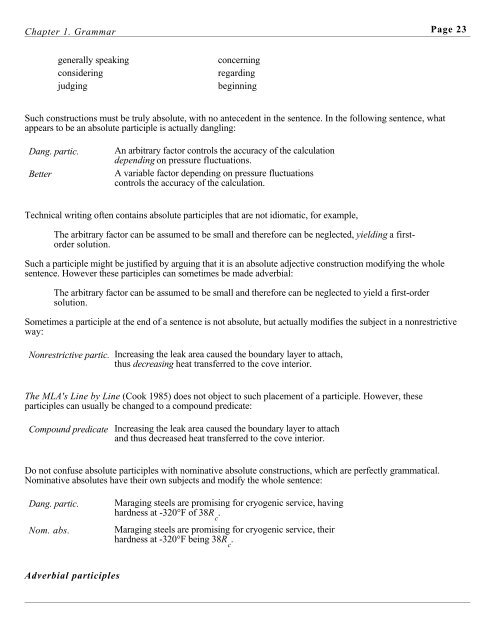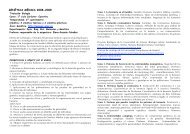Grammar, Punctuation and Capitalization - Handbook for Technical ...
Grammar, Punctuation and Capitalization - Handbook for Technical ...
Grammar, Punctuation and Capitalization - Handbook for Technical ...
Create successful ePaper yourself
Turn your PDF publications into a flip-book with our unique Google optimized e-Paper software.
Chapter 1. <strong>Grammar</strong> Page 23generally speakingconsideringjudgingconcerningregardingbeginningSuch constructions must be truly absolute, with no antecedent in the sentence. In the following sentence, whatappears to be an absolute participle is actually dangling:Dang. partic.BetterAn arbitrary factor controls the accuracy of the calculationdepending on pressure fluctuations.A variable factor depending on pressure fluctuationscontrols the accuracy of the calculation.<strong>Technical</strong> writing often contains absolute participles that are not idiomatic, <strong>for</strong> example,The arbitrary factor can be assumed to be small <strong>and</strong> there<strong>for</strong>e can be neglected, yielding a firstordersolution.Such a participle might be justified by arguing that it is an absolute adjective construction modifying the wholesentence. However these participles can sometimes be made adverbial:The arbitrary factor can be assumed to be small <strong>and</strong> there<strong>for</strong>e can be neglected to yield a first-ordersolution.Sometimes a participle at the end of a sentence is not absolute, but actually modifies the subject in a nonrestrictiveway:Nonrestrictive partic. Increasing the leak area caused the boundary layer to attach,thus decreasing heat transferred to the cove interior.The MLA's Line by Line (Cook 1985) does not object to such placement of a participle. However, theseparticiples can usually be changed to a compound predicate:Compound predicate Increasing the leak area caused the boundary layer to attach<strong>and</strong> thus decreased heat transferred to the cove interior.Do not confuse absolute participles with nominative absolute constructions, which are perfectly grammatical.Nominative absolutes have their own subjects <strong>and</strong> modify the whole sentence:Dang. partic.Nom. abs.Maraging steels are promising <strong>for</strong> cryogenic service, havinghardness at -320°F of 38R c.Maraging steels are promising <strong>for</strong> cryogenic service, theirhardness at -320°F being 38R c.Adverbial participles






